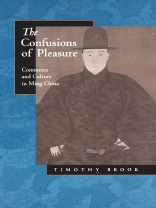The Ming dynasty was the last great Chinese dynasty before the Manchu conquest in 1644. During that time, China, not Europe, was the center of the world: the European voyages of exploration were searching not just for new lands but also for new trade routes to the Far East. In this book, Timothy Brook eloquently narrates the changing landscape of life over the three centuries of the Ming (1368-1644), when China was transformed from a closely administered agrarian realm into a place of commercial profits and intense competition for status.
The Confusions of Pleasure marks a significant departure from the conventional ways in which Chinese history has been written. Rather than recounting the Ming dynasty in a series of political events and philosophical achievements, it narrates this
longue durée in terms of the habits and strains of everyday life. Peppered with stories of real people and their negotiations of a rapidly changing world, this book provides a new way of seeing the Ming dynasty that not only contributes to the scholarly understanding of the period but also provides an entertaining and accessible introduction to Chinese history for anyone.
Table of Content
List of Illustrations
Preface
A Ming Chronology
A Genealogy of Ming Emperors
List of Abbreviations
Introduction: Seasons of the Ming (I609)
Dramatis Personae
Winter: The First Century (1368-1450)
A Brick in the Wall
The Burden of Communication
Ideas into Texts
Economy and Exchange
The Distance between Rich and Poor
Spring: The Middle Century (1450-1550)
The Center Recedes
State and Market
Commerce
Commerce and Culture
The Zhengde Decay
Summer: The Last Century (I550-I644)
The God of Copper Cash
Travels and Letters
Consumption and Production
Trade
Fashion
Fall: The Lord of Silver (I642-I644)
The Fall of the Ming
Last Glimpses
Notes
Bibliography
Glossary and Index
About the author
Timothy Brook is Professor of History at the University of Toronto. He is the author of Praying for Power: Buddhism and the Formation of Gentry Society in Late-Ming China (1993), and Quelling the People: The Military Suppression of the Beijing Democracy Movement (1992), and the coeditor of Nation Work: Asian Elites and National Identities (1999) and China and Historical Capitalism: Genealogies of Sinological Knowledge (1999).












